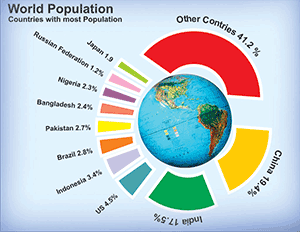From Africa to South America to Asia, expanding populations are mounting pressure on resources. Even in the Northern hemisphere, in Europe and America, where the rate of population growth is lower, governments grapple with social provision for the poor.
Special Correspondent, Sam Nwokoro, examines the problem against the background of Thomas Malthus’ theory on population growth.
Source: www.efergy.com
God, the Creator, gave us the privilege to multiply, but the resources available on earth are fixed.
Humans are “to exploit the earth and subdue it” and people interpret this to mean “take as much as you desire, don’t bother about how much you multiply.” The result is the trauma of nations contending with the almost insatiable need of humans in the 21st century.
Resources available to nations today are minuscule compared with the challenges of providing quality life.
A world awash with people
Caroline Binder, a European Union (EU) environment expert, noted that the population growth of the later part of the 20th century and this 21st century occurred due to the jump of birth rate over death rate.
Less death is occurring as a result of strides made in maternal and child medicare, increase in food production and distribution around the world, improvement in public health, especially in developed countries, medical technology that has discovered and treated diseases, improved education and living conditions in some parts of the world.
Birth rate has been outstripping death rate since the 1980s, meaning that the population of the world has been increasing. But resources and development have not matched the growth. It is noticeable in developing countries. This has produced the ugly spectacle of unemployment, under employment, poor wages, increased urban crime and strained social services.
This plague is prevalent in Africa, Eastern Europe and the Middle East, according to the United Nations Population Programme (UNDP).
Caroline Binder, a population expert whose treatise has helped UN population activities, also observed that improvement in public health has aided the decline of child and maternal deaths in the past two decades in many parts of the world.
Evidence is seen in the reduction of the main child killer diseases such as cholera, diptheria, tuberculosis, tetanus, whooping cough, malaria and dysentery.
The establishment of many global health foundations has also reduced mortality rate. Initiatives like the Jimmy Carter Guineaworm Eradication Programme is estimated to have saved more than five million lives in Africa between 1996 and 2010, a feat that earned the former United States President a Nobel peace prize for humanitarian work.
What all this means is that over the years, governments the world over have been finding it difficult to cater for the social needs of their mammoth populations. Political structures in the Southern hemisphere still hinder a large portion of citizens from obtaining material comfort, especially in less democratised societies.
Even developed countries such as the United States, United Kingdom, Canada, France, and Germany have been having it rough providing for disempowered citizens.
Since the unification of East and West Germany in 1991, the population of the country has quadrupled, and the burden of bringing up the newly assimilated citizens of the East is huge on the welfare system.
The UNDP estimates that Nigeria’s estimated current population of 170 million will rise to 208 million by 2025.
Implications for Nigeria, the world
As the world begins to appraise its size and the implication, Nigeria – the most populous country in Africa – also has to consider the impact of its policies on its growing population.
An environmentalist in the research and documentation department in the Presidency, Ledum Mittee, said recently at a public forum that although the Niger Delta is a small “nation”, it has borne more of the punishment of earth’s defilement due to the activities of companies prospecting crude oil.
“We fear a situation in future when the Niger Delta may be declared as a no more viable ecosystem. Nigeria has for long depended on oil export to feed its population and this since 1958. Successive governments have not been imaginative for all these donkey years to diversify the economy due to the arbitrariness of military regimes over the years,” he recalled.
“The consequence has been that more than 50 years after the discovery of oil, the real sectors of the economy have been neglected, and because of this job opportunities have been so minuscule to cater for the army of jobless and under-employed people.
“So where are we in the population matrix? It is that today, Niger Deltans are impoverished, with more than 70 per cent of our people living wretched lives in their country.
“Their source of livelihood, the sea – because they are island people – has largely been rendered unproductive due to oil pollution. They can no longer fish, farm or plant. And they don’t have oil licences to be able to be lifting and drilling oil like the big men due to the kind of fiscal politics we run in this country. So where do we go from here?”
Mittee, a Niger Delta activist, noted that Abuja has created a Future Generation Fund to deal with population growth. But the effect is minimal.
Another environmentalist, Odion Akhaine of Friends Of the Earth (FOE), said “it is not as if God did not provide sufficiency for the earth’s inhabitants, it is that we have mismanaged the resources of the earth and cared little to preserve the earth and its inhabitants.
“Bad governments in most parts of the worlds have been their people. Corrupt African states have imperilled development and created unemployment, crime and all sorts of deviance.
“Even some of the so-called Western nations have supported bad governments who cheated on their people because of such countries’ economic interests. The West propped up Hosni Mubarak of Egypt until he died. They saw him as a hedge between their interests in the Middle East and fundamentalists in that region.
“That was why Mubarak wanted to become a life President in this 21st century in spite of his obvious non-performance amid growing population and poverty. That is the tragedy.”
Scary figures
Latest figures from the United Nations Population Programme (UNPP) and the UNDP show that Asia is currently the most populated continent with 4.3 billion people, accounting for 60 per cent of world population.
The two most populated countries in the world, China and India, together constitute about 37 per cent of global population. Africa is the second most populated continent with about one billion people or 15 per cent of world’s humanity.
Europe’s 733 million people make 12 per cent of global population, while Latin America and the Caribbean have 600 million (9 per cent), and Northern America has 353 million (5 per cent).
In 1350, the world was inhabited by 370 million people.
The current figure, seven billion, is estimated to rise to 16 billion by 2100. The lowest estimate says it may decline to six billion.
Challenges
Global demographic trends show that by 2025, the problem of unemployment may get worse unless governments continue efforts at inclusive economic growth. Even in the U.S., the only country that runs an open opportunity political economy, about 33 million people are not gainfully employed, meaning that they are not earning enough wages to make savings.
Data from the UNDP and UNPP also show that because of urbanisation following liberal reforms across countries, many people are being pushed down the social ladder, especially in poor countries previously under state-controlled economies.
Still a sustainable population
It was Thomas Malthus, the British economist, who formulated the concept that the earth’s resources diminish as population increases because resources are fixed while population is regenerative.
Although Malthus’ scary theory on population explosion is a precaution, global development trends suggest that the predicted doom is still far. In the last two decades, many countries have migrated from poor and less developed to developing and developed status.
Before the 1980s there were no economic tigers, as there are today the Asian tigers and BRIC (Brazil, India, China) countries. Information communication technology is spreading industrial development around the world.
Most countries, including Nigeria are spending more on education than previously. The Transformation Agenda of President Goodluck Jonathan has been raising the budget for education, only 4 per cent short of 25 per cent of annual budget recommended by United Nations Educational Scientific and Cultural Organisation (UNESCO).
It is still the view of global rating agencies that if governments are consistent in the development of manpower, more BRIC and Asian tiger economies can be created out of Africa, Latin America and North East Asia – where the rate of development is slow, and where population explosion is most acute.
UN agencies have been calling on governments to implement “inclusive growth” in development co check over-population.
That is not a myth but an attainable blueprint, once there is genuine commitment.
Nigeria, six years from now
The population of Nigerians aged between 10 and 24 years, put at 44.4 million or 33.1 per cent of the total population in the census estimates in 2006, reached an estimated 60.4 million in 2014, according to National Population Commission (NPC) Chairman, Eze Duruiheoma.
He disclosed the figure through NPC Ondo State Commissioner, Oluremi Akimbobola, in Akure on World Population Day on July 11 that by 2020 when Nigeria’s population estimates would be 221.3 million, the youth population would be 73.1 million.
Duruiheoma urged stakeholders to ensure a safe, successful and healthy passage from adolescence into adulthood, which is the right of every child.
According to him, this can only be achieved if families and societies invest in and provide opportunities for adolescents and youths to develop knowledge, skills and resilience needed for a healthy, productive and fulfilling life.














